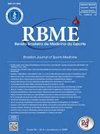负荷训练对跑步运动员体能的影响
4区 医学
Q4 Health Professions
Revista Brasileira de Medicina do Esporte
Pub Date : 2023-03-30
DOI:10.1590/1517-8692202329012023_0044
引用次数: 0
摘要
摘要简介:心肺能力和运动耐力对跑步运动员来说非常重要。目的:研究负荷跑步训练是否能提高体能,重点关注跑步运动员的心肺能力和运动耐力。方法:选择36名职业运动员。一组进行正常跑步训练,另一组进行负重跑步训练。结果:负重训练小组,FVC从5.13±0.20,5.68±1.25,残从4.38±0.33,4.56±0.35,PEF从8.27±0.98,8.88±1.02,ERV从1.44±0.37,1.68±0.34,印度河流域文明从4.91±0.45,5.28±1.46,VT从1.10±0.25,1.42±1.26,收缩压变化从115.16±8.18,117.02±5.47,舒张压变化从78.58±8.97 78.16±7.42,多种多样,BPM 73.42±9.27,73.52±9.02,血清乳酸值为1.36±0.28 ~ 1.31±0.27,肌酸激酶值为21.85±59.02 ~ 208.11±49.20。结论:负荷跑步训练对运动员体能有积极影响,可增加负荷跑步训练提高运动员的心肺功能和运动耐力。证据等级II;治疗性研究——对治疗结果的调查。本文章由计算机程序翻译,如有差异,请以英文原文为准。
EFFECT OF LOAD TRAINING ON PHYSICAL FITNESS IN RUNNING ATHLETES
ABSTRACT Introduction: Cardiopulmonary capacity and sports endurance are very important for running athletes. Objective: Study whether running with load training can improve physical fitness, focusing on running athletes’ cardiopulmonary capacity and exercise endurance. Methods: 36 professional athletes were selected. One group was trained with normal running and the other group was trained with running with a weight load. Results: In the weight-bearing training group, FVC went from 5.13 ± 0.20 to 5.68 ± 1.25, FEV1 went from 4.38 ± 0.33 to 4.56 ± 0.35, PEF went from 8.27 ± 0.98 to 8.88 ± 1.02, ERV went from 1.44 ± 0.37 to 1.68 ± 0.34, IVC went from 4.91 ± 0.45 to 5.28 ± 1.46, VT went from 1.10 ± 0.25 to 1.42 ± 1.26, systolic blood pressure varied from 115.16 ± 8.18 to 117.02 ± 5.47, diastolic blood pressure varied from 78.58 ± 8.97 78.16 ± 7.42, BPM varied from 73.42 ± 9.27 to 73.52 ± 9.02, serum lactic acid was from 1.36 ± 0.28 to 1.31 ± 0.27, and serum creatine kinase was from 21.85 ± 59.02 to 208.11 ± 49.20. Conclusion: Load running training positively impacts athletes’ physical fitness and may be added to improve athletes’ cardiorespiratory capacity and exercise endurance. Level of evidence II; Therapeutic studies - investigation of treatment outcomes.
求助全文
通过发布文献求助,成功后即可免费获取论文全文。
去求助
来源期刊

Revista Brasileira de Medicina do Esporte
PHYSIOLOGY-SPORT SCIENCES
自引率
0.00%
发文量
204
审稿时长
6-12 weeks
期刊介绍:
The Revista Brasileira de Medicina do Esporte (RBME in its Portuguese form) is an official organ of the Sociedade Brasileira de Medicina do Exercício e do Esporte (SBME) Brazilian Society of Exercise Medicine and Sports) and represents the main promotion resource of the scientific production in the Exercise Sciences and Sports Medicine (SBME) fields in our country. The RBME was launched in 1995 with trimester periodicity and became regularly bi-monthly published with no interruptions from 1999.
RBME is an inter-and multidisciplinary, peer reviewed, Open Access journal which accepts contributions from the national and international scientific community. RBME publishes original articles of high scientific relevance in Exercise and Sports Medicine, review articles, and systematic reviews.
RBME preferably publishes original articles of international interest, not only of regional significance. Its goal is to disseminate the scientific production in the areas of exercise and sports medicine through the publication of original research results and other documents that contribute to the scientific and applied knowlewdge of physical activity, exercise and sports, within the framework of biological sciences and medicina.
Its title abbreviation is Rev Bras Med Esporte, which should be used in references, footnotes and reference subtitles.
 求助内容:
求助内容: 应助结果提醒方式:
应助结果提醒方式:


